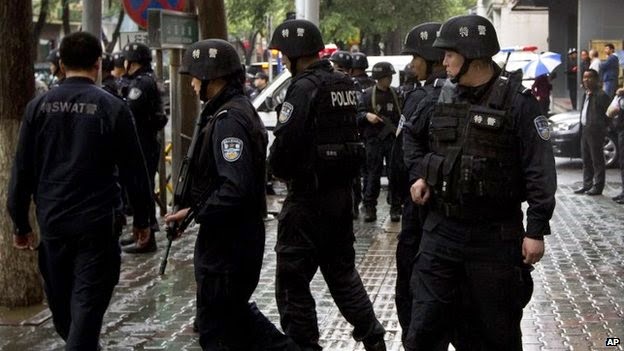China Xinjiang: Police kill 13 attackers
Posted by Unknown on Saturday, June 21, 2014 | 0 comments
Thirteen assailants have been killed in an attack on a police station in China's restive western province of Xinjiang, officials say.
The attackers drove a car into the station and set off explosives on Saturday morning, the local government said on its website.
Three police suffered minor injuries but no civilians were hurt, it added.
The Chinese authorities blame Muslim Uighurs from Xinjiang for an increasing number of attacks in the province.
"On the morning of 21 June, a group of thugs drove a car into a police building in Yecheng County, Kashgar province and detonated explosives," the local government website said.
"Police shot dead the 13 attackers," it reported. It provided no further details.
Verifying reports from the Xinjiang region is difficult because access for journalists is restricted and the flow of information is tightly controlled.
'Terrorist attacks'
The authorities have tightened security in Xinjiang in recent months.
On Monday, China executed 13 people in Xinjiang for what it called "terrorist attacks".
The authorities also sentenced three men - believed to Uighurs - over a fatal car crash in Beijing last year.
Five people were killed when a car ploughed into a crowd in Beijing's Tiananmen Square last October. Dozens of others were injured.
Attacks blamed by Beijing on Uighur separatists include deadly bomb and knife attacks on railway stations in Urumqi in Xinjiang, and Kunming in south-west China.
Uighur leaders deny that they are co-ordinating a terrorist campaign.
Activists have accused Beijing of exaggerating the threat from Uighur separatists to justify a crackdown on the Uighurs' religious and cultural freedoms.
- Uighurs are ethnically Turkic Muslims
- They make up about 45% of the region's population; 40% are Han Chinese
- China re-established control in 1949 after crushing short-lived state of East Turkestan
- Since then, there has been large-scale immigration of Han Chinese
- Uighurs fear erosion of traditional culture




